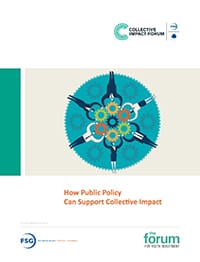Addressing complex problems requires a collective impact approach, and public policymakers have a critical role to play in supporting the conditions necessary to achieve collective impact. Drawing on interviews with policymakers, extensive secondary research, and their own policy experience, the authors share examples and recommendations of public policies that enable communities to tackle complex social problems using collective impact.
Top Takeaways
- Many examples illustrate how public policy can support collective impact initiatives, including: Working Cities Challenge, Performance Partnership Pilots, and the State of Colorado’s Department of Human Services.
- Policymakers can support the 5 conditions of collective impact in a variety of ways, such as by awarding planning grants for common agenda development, creating data sharing agreements, allowing for blended funding streams, requesting documentation of communication activities, and providing funding for backbone support.
- Broader adoption of public policies that encourage collaboration will require changes to policymaking structures, accountability mechanisms, and auditing and accounting practices.

